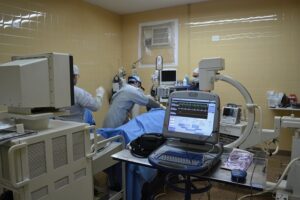The Role of Family in Supporting ARDS Patients in the ICU
The Role of Family in Supporting ARDS Patients in the ICU
Acute Respiratory Distress Syndrome (ARDS) is a serious and complex medical condition that can evoke considerable anxiety and uncertainty, not just in the patients who experience it but also for their families. The transition of a loved one into an Intensive Care Unit (ICU) can be overwhelming for families, marked by a mix of fear, confusion, and helplessness. Family members play a crucial role in the recovery process, acting as advocates, supporters, and essential communication links between healthcare providers and the patient. Understanding ARDS, its implications, and how families can provide support is vital for maintaining hope and promoting healing.
In this article, we will explore the role families play in supporting ARDS patients in the ICU, the challenges they may face, and actionable steps they can take to foster a positive and healing environment. We will also address frequently asked questions about ARDS and provide resources for families navigating this difficult landscape.
Understanding ARDS
Acute Respiratory Distress Syndrome is a life-threatening condition characterized by the rapid onset of respiratory failure due to inflammation and fluid accumulation in the alveoli. It can be triggered by various factors, including pneumonia, sepsis, trauma, or aspiration of fluids into the lungs. The severity of ARDS is classified into three categories: mild, moderate, and severe, based on the level of oxygenation and patient’s clinical presentation.
During an episode of ARDS, patients typically require mechanical ventilation and close monitoring in the ICU setting. This form of respiratory support is necessary because ARDS severely hampers the lungs’ ability to transfer oxygen into the bloodstream, leading to systemic complications if not managed promptly and effectively. While medical teams are adept at managing ARDS, the role of family in providing emotional, psychological, and sometimes even physical support is equally significant.
- ARDS can develop from various causes, such as infection, trauma, or aspiration.
- The condition impacts the lungs’ ability to function, leading to insufficient oxygen delivery to the body.
- Patients with severe ARDS often require mechanical ventilation in the ICU.
The Family’s Vital Role
Family support can significantly impact the recovery trajectory of ARDS patients in the ICU. Research has shown that when families are actively involved in the care process, it can lead to improved patient outcomes and reduced feelings of anxiety for both patients and their relatives. Emotional support, clear communication, and participation in care planning are key facets of this involvement.
Emotional support provided by family members can alleviate feelings of isolation and helplessness that many patients experience in the ICU. Being present, holding a patient’s hand, or even talking softly can make a world of difference. Studies indicate that patients who receive strong emotional support often exhibit positive indicators of recovery, even amid severe distress.
Along with emotional support, families can also serve as essential communication bridges between the medical team and the patients. They can help clarify medical terms, remember treatment plans, and articulate the patient’s wishes or concerns to the healthcare team. This advocacy is crucial in an ICU environment where medical jargon and complex decisions can often bewilder patients and their loved ones.
- Family presence encourages emotional well-being in patients, fostering a sense of connection.
- Clear communication between families and healthcare providers enhances understanding and compliance with treatment.
- Families can advocate for the patient’s needs and preferences, fostering patient-centered care.
Managing the Emotional Impact
The ICU can evoke a myriad of emotions, including fear, sadness, and frustration. Family members often find themselves in a state of perpetual uncertainty—waiting for updates, struggling to comprehend medical jargon, and navigating the highs and lows of their loved one’s condition. Managing these emotions while being a supportive presence for the patient can be difficult. Acknowledging one’s feelings is the first step toward effective coping.
Furthermore, families should prioritize self-care during this strenuous period. Engaging in activities that alleviate tension—such as brief recreational diversions, exercise, or mental health support—can help family members maintain their well-being. Support groups, either online or in-person, can be beneficial avenues for sharing experiences and strategies, offering a space where families can feel heard and understood.
Understanding that their loved one may experience a wide range of emotions as well can help family members offer better support. Patients may express anger, frustration, fear, or sadness, and allowing space for these feelings while providing acceptance and reassurance is essential.
- Recognize and validate your feelings—acknowledge the stress and anxiety of the situation.
- Practice self-care, whether through exercise, hobbies, or professional support.
- Understand that patients may express strong emotions; empathetic listening can foster connection and support.
Effective Communication With Healthcare Providers
Effective communication with the healthcare team is crucial in the ICU. Families are often overwhelmed by the medical environment, and it’s easy to feel lost in the processing of information, particularly when time is of the essence. Families should feel encouraged to speak up, ask questions, and seek clarification about their loved one’s condition, treatment options, and prognosis. Building a rapport with the medical staff can make the journey more manageable.
One effective strategy families can employ is to designate a primary spokesperson. This individual can be responsible for gathering information and relaying it to other family members, allowing for more focused discussions with healthcare providers. Documenting important information during meetings, such as changes in condition or treatment adjustments, will also be invaluable for future reference.
Additionally, using a notebook or a digital tool to jot down questions and notes can help retain clarity and ensure family’s inquiries are addressed. It is acceptable to ask difficult questions; understanding the medical route empowers families and fosters a transparent relationship with healthcare professionals.
- Designate a spokesperson within the family to streamline communication with healthcare providers.
- Document critical information and questions to ensure nothing is overlooked during conversations.
- Encourage open dialogue; ask questions even if they seem difficult or uncomfortable.
Supporting Daily Needs and Comfort Measures
In addition to emotional support and effective communication, families have a practical role in caring for ARDS patients. Providing comfort measures can greatly enhance the quality of care experienced by the patient. Simple gestures—such as adjusting bedding, offering favorite blankets, or providing familiar items like photographs or books—can establish a comforting environment in an otherwise clinical setting.
Additionally, family members can assist with daily needs, depending on the patient’s condition and the level of medical intervention required. Although patients with ARDS may be immobile or on ventilation, advocating for basic needs—such as maintaining hygiene, adjusting positions to relieve pressure, or ensuring privacy during care—are essential. Ensuring that hydration and nutritional needs are being met, whether through IV fluids or in other forms, is equally important.
- Offer comfort measures, such as familiar items, to create a home-like atmosphere.
- Advocate for daily needs—ensuring hygiene, comfort, and privacy.
- Pay attention to hydration and nutrition; discuss with healthcare providers how best to meet these needs.
Intervention and Decision-Making
In some cases, families may find themselves facing tough ethical or medical decisions regarding their loved one’s care. Discussions around end-of-life care, transition from aggressive treatment, or palliative pathways may arise. These are inherently challenging conversations, often layered with emotion, and can place families in difficult positions.
During such times, it is crucial that families feel empowered to discuss their loved one’s values and wishes with healthcare providers. If the patient has expressed prior wishes regarding their care or treatment options, using these preferences as a guiding light can help ground decision-making. Documentation of an advance directive can also be beneficial, clarifying the patient’s desires in situations where they may not be able to articulate them themselves.
Many healthcare institutions have ethics committees or chaplaincy services that families can consult for additional support as they navigate these challenging waters. Seeking therapy or counseling during or after these discussions can be helpful for family members who may find themselves burdened by decisions that may have profound implications.
- Discuss patient values and wishes with healthcare providers to guide decision-making.
- Consider engaging with ethics committees for additional support during tough decisions.
- Seek professional counseling or therapy following difficult decisions to process emotions.
Frequently Asked Questions (FAQs)
What is the immediate treatment for ARDS?
Immediate treatment typically includes administering oxygen therapy or mechanical ventilation, along with addressing the underlying cause—such as infection or fluid management.
Can ARDS patients communicate while intubated?
Patients who are intubated may not be able to speak, but they may utilize gestures or written communication to express thoughts, needs, or emotions.
How long do ARDS patients stay in the ICU?
The length of stay can vary widely, ranging from days to weeks, depending on the severity of ARDS and the patient’s response to treatment.
What complications can arise from ARDS?
Complications of ARDS can include lung scarring, prolonged mechanical ventilation, pneumonia, and post-intensive care syndrome, among others.
How can family members best cope while a loved one is in the ICU?
Family members should engage in self-care, seek support groups, and utilize available hospital resources, including social workers and chaplains, to cope with the emotional challenges.
Resources for Families Dealing with ARDS
Several organizations and websites provide invaluable information and support for families dealing with ARDS:
- American Lung Association – ARDS Information
- National Heart, Lung, and Blood Institute – ARDS
- American Association for Respiratory Care – Resources for Patients and Families
- Critical Care Resources – International Perspectives on ICU Care
Conclusion
Managing an Acute Respiratory Distress Syndrome diagnosis in the ICU requires tenacity, courage, and resilience—not just from patients but from their families too. The love and support that family members can provide play an irreplaceable role in the healing process. By acting as advocates, effective communicators, and sources of emotional strength, families become indispensable in the journey to recovery.
Knowledge about ARDS, combined with practical strategies for navigating the uncertainties of the ICU environment, can empower families to provide the necessary support their loved ones need. Remember that while the medical team focuses on the physiological aspects of recovery, the familial bonds and the emotional support they provide often lay the groundwork for a successful healing journey.
In these challenging times, remember to care for yourself just as you care for your loved one. Embrace the support of fellow family members, reach out to professionals when necessary, and take heart in knowing that your presence can significantly impact your loved one’s journey through ARDS.
About ARDS and Post-ARDS
ARDS (Acute Respiratory Distress Syndrome) is a life-threatening condition typically treated in an Intensive Care Unit (ICU). While ARDS itself is addressed during the ICU stay, recovery doesn’t end with discharge; patients then embark on a journey of healing from the effects of having had ARDS.
Disclaimer
The information provided in ARDS Alliance articles is for general informational and educational purposes only and is not a substitute for professional medical advice, diagnosis, or treatment. While we strive to present accurate, current information, the field of Acute Respiratory Distress Syndrome (ARDS) and related healthcare practices evolve rapidly, and ARDS Alliance makes no guarantee regarding the completeness, reliability, or suitability of the content.
Always seek the advice of qualified healthcare professionals with any questions you may have regarding a medical condition. Never disregard professional medical advice or delay seeking it because of information you read in ARDS Alliance articles. ARDS Alliance, its authors, contributors, and partners are not liable for any decision made or action taken based on the information provided in these articles.
About ARDS Alliance
Our mission is to improve the quality of life for ALL those affected by ARDS.
The ARDS Alliance is a non-profit committed to raising awareness and enhancing the understanding of Acute Respiratory Distress Syndrome (ARDS), a severe lung condition often occurring in critically ill patients. Through developing alliances, it unites various organizations and experts striving to improve care and support research aimed at finding more effective treatments. Their efforts include educating the public and healthcare providers about ARDS symptoms, risk factors, and advancements in treatment, ensuring better patient outcomes and resource availability.

I am dedicated to advancing research and education about Acute Respiratory Distress Syndrome. Our mission is to improve outcomes for patients and their families by providing support and resources for healthcare professionals. Together, we can make a difference in the lives of those affected by ARDS.
~ Paula Blonski
President, ARDS Alliance





